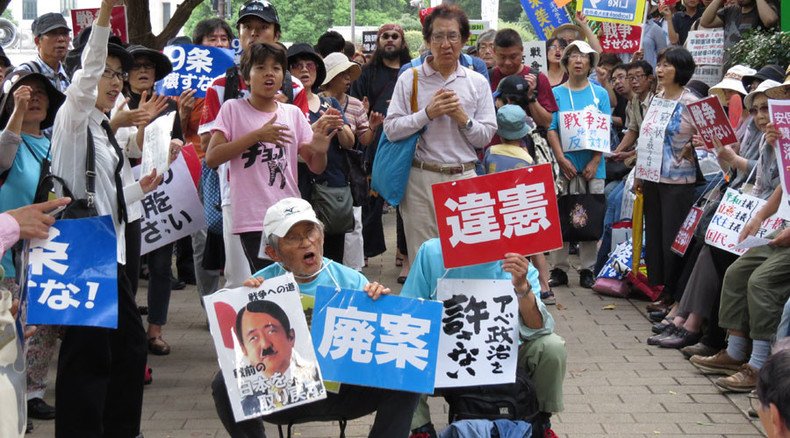End of Japan’s pacifism? Parliament approves war bills allowing troops to fight abroad

The upper house of Japan's parliament has approved legislation giving more power to the armed forces. This includes permitting the military to fight overseas – something banned for 70 years since WWII.
The Upper House’s final session was called late Friday night and finished early Saturday morning with the enactment of the two controversial security bills. The laws are expected to mark a significant departure from Japan’s postwar pacifism.
Prime Minister Shinzo Abe, whose ruling block extended the session to Sept. 27 and voted down all the motions from the opposition to ensure that the legislation was passed, says that Japan needs to be up to the challenge in today’s world, taking into account a rising threat from China.
READ MORE: Scuffle in Japan upper house as panel approves controversial military bills (VIDEO)
The Lower House passed the bills on July 16 – an act, which was followed by a wave of protests across the country. A panel discussion in the Diet on Thursday was marked by scuffles.
The legislation deals with 10 security laws that are currently in force, one of them prohibiting collective self-defense. Japan will now have a constitutional right to deploy troops overseas and assist during military operations involving a foreign or multinational force in cases where Japan faces a "threat to its survival". The shift may force Japan into US-led conflicts.
This "is necessary to protect the people's lives and peaceful way of living and is for the purpose of preventing wars," Abe told reporters Saturday morning. "I want to keep explaining the laws tenaciously and courteously."
The majority of Japanese people were against enacting the militaristic laws. A media survey published by Asahi Shimbun newspaper on Monday found that 54 percent of respondents opposed the bills, with just 29 percent in favor.
READ MORE: ‘War is over!’ Anti-military protesters rally in Tokyo against Abe policy
The unpopular bill has sparked a wave of indignation among the Japanese still standing for a more peaceful policy. Thousands of people took to streets in Tokyo on Sunday holding banners, saying “War Is Over”, “Peace, Not War” or carrying the portraits of Shinzo Abe with “No War” words on them. A 120,000-strong demonstration was also staged last month.
横浜公聴会に抗議する人々、半端な数ではない。
山本宗補撮影 pic.twitter.com/bAwzJglbt8
— 山本宗補 (@asama888) September 16, 2015Protesters surround #Diet building, opposing security bills - http://t.co/qmxPBOmlPFpic.twitter.com/ytJRb7Pmoe
— The Mainichi (@themainichi) September 14, 2015China is not happy about the move and before the final vote urged the Japanese government to take into account the anti-war moods in the country.
"Recently we have noticed that voices in Japan opposing the bill have become louder by the day," Chinese foreign ministry spokesman Hong Lei told at a briefing on Friday. "We demand that Japan earnestly listen to these just voices domestically and internationally, learn the lessons of history, uphold the path of peaceful development, speak and act cautiously in security and military matters and take actual steps to maintain regional peace and stability."
LISTEN MORE:












